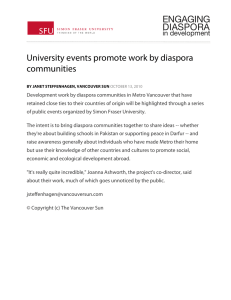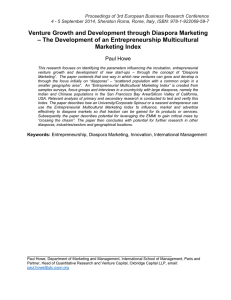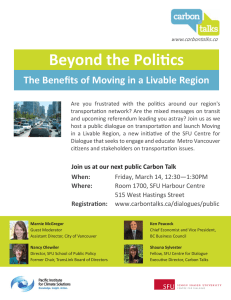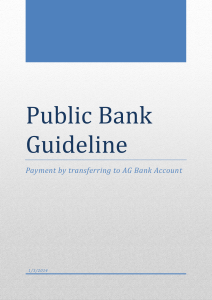Document 13955227
advertisement
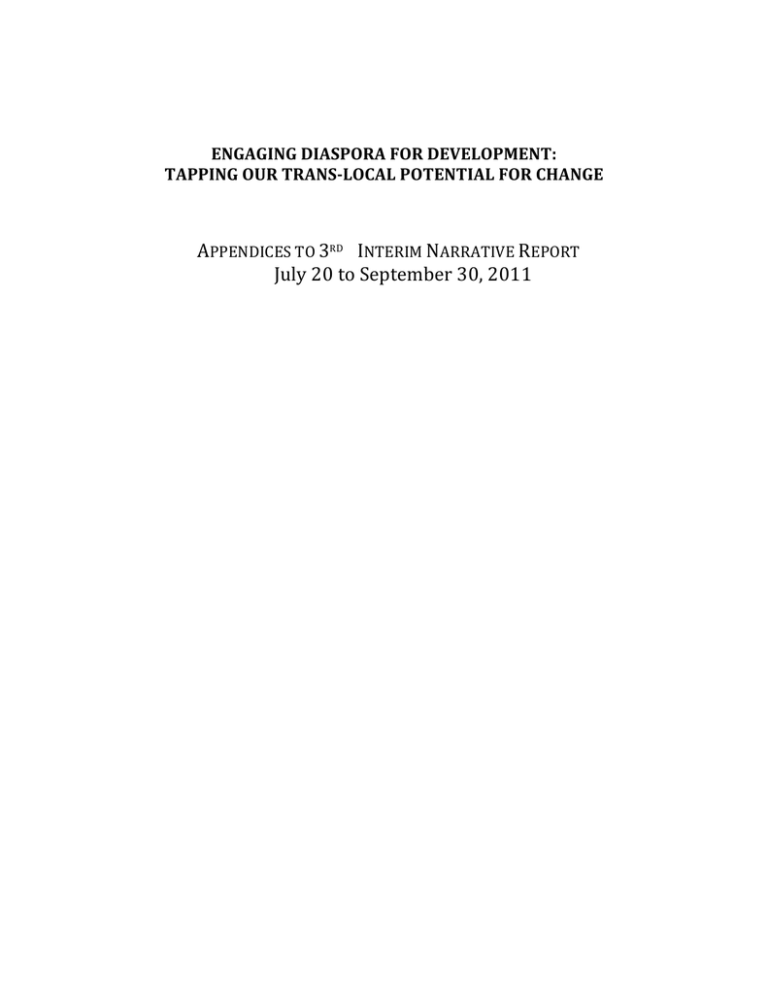
ENGAGING DIASPORA FOR DEVELOPMENT: TAPPING OUR TRANS-­LOCAL POTENTIAL FOR CHANGE APPENDICES TO 3RD INTERIM NARRATIVE REPORT July 20 to September 30, 2011 APPENDIX 110.1A: PROJECT ADVISORY COMMITTEE – TERMS OF REFERENCE Engaging Diasporas in Development Tapping the Trans-Local Potential for Change Terms of Reference for the Project Advisory Committee 1. Purpose 1.1 The purpose of the Project Advisory Committee (PAC) of SFU’s Engaging Diasporas in Development: Tapping the Trans-Local Potential for Change is to provide advice and feedback to the Project Management Team1 on the directions, policies, and curricula as they affect the planning, focus and outreach for the Engaging Diasporas series of activities. These activities and events include an environmental scan of diaspora “trans-local” development work initiated within Metro Vancouver; focus group research; five public dialogues; and a series of learning workshops for leaders of diaspora development initiatives. The project will commence in April 2010 and finish in November 2011. 2. Objectives The objectives of the PAC are: 2.1 to act as a resource to the Program Management Team on planning, implementation and evaluation of the public dialogues’ themes and speakers, the curriculum for the leadership workshops Engaging Diasporas in Development: Tapping the Trans-Local Potential for Change. 2.2 to serve as a mechanism to develop, clarify and exchange ideas and concerns related to the Project as identified by committee members and their particular communities of interests. 2.3 to serve as a communications vehicle to the community of Metro Vancouver and the rest of BC and Canada on the work and plans of the Project and its impact on the participants and the communities that they serve. 3. Membership 3.1 The PAC shall consist of representatives of diverse organizations such as faculty, practitioners, students, diaspora, and the community at large. 3.2 Membership shall include, but not be limited to, representatives from diverse settings as noted above. 3.3 In addition, representatives shall be identified from organizations within the following designated categories: 1 Members of the Project Management Team include Co-Directors Dr. Joanna Ashworth, Dialogue Programs and Ms. Shaheen Nanji, International Development and Faculty Engagement, Dr. Robert Anderson, School of Communication, Dr. James Busumtwi-Sam, Department of Political Science, project administrator and a Coop Student Project Coordinator. • • • • • A minimun of six faculty (including the three academic advisors on the management team) Four community (diaspora leadership representatives) Four staff (two directors, 1 administrator, 1 Coop student) Up to three external Project partners (CUSO/VSO and BCCIE) Graduate Students as recommended 3.4 In the event that the PAC determines its membership or terms of reference not to be appropriate, it shall have the power to recommend to the Project Directors amendments to these Terms of Reference. 3.5 Membership is at the invitation of the SFU Project Directors, SFU. 4. Reporting 4.1 Outcomes of the meetings will be documented and contribute to the Project planning process managed by the Project Management Team to inform themes, organizing questions and curriculum, marketing, or community networking for the program. 5. Quorum and Decision Making 5.1 A majority (50% plus 1) of all members shall constitute a quorum for the meetings of the PAC. 5.2 Decision-making will be by consensus. 6. Process 6.1 The PAC shall meet at least four times over the 20-month project duration (May and September, 2010 and March and September, 2011). An agenda for each meeting shall be sent two weeks prior to the meeting. Members of the PAC will be encouraged to contribute to the agenda. Members of the PAC may also wish to participate in AdHoc advisory group meetings to plan each of the specific public dialogues and/or development workshop series. PAC members will also advise the Project Management Team regarding a strategy to populate these planning tables. Revised by Management Committee March 18, 2010 APPENDIX 110.1B: PROJECT ADVISORY COMMITTEE MEMBERS (Updated October 16, 2010) Engaging Diasporas for Development Tapping the Trans Local Potential for Change Project Advisory Committee (PAC) Members Project Co-Directors 1. Joanna Ashworth, Research Associate, Centre for Sustainable Community Development, 2. Shaheen Nanji, Director, International Development, SFU International SFU Faculty Robert Anderson, School of Communication James Busumtwi-Sam, Department of Political Science Kina Chenard, Office of Francophone and Francophile Affairs Alexander Dawson, Latin American Studies John Harriss, School for International Studies Derryl MacLean, Centre for Comparative Studies of Muslim Societies & Cultures June Francis, Faculty of Business SFU Students Nadia Chaney, Artist, Graduate Student, Education Panther Kuol, SFU Student Partners Randall Martin, Executive Director, BC Centre for International Education Umeeda Switlo, Public Engagement Officer CUSO- VSO Rosa Candia, Diaspora Volunteering Program Coordinator CUSO-VSO Community Partners Amos Kambere, Executive Director, Umoja Society Joe Knockaert, formerly head of CIDA Pacific Regional Office Meharoona Ghani, Director, Multiculturalism and Anti-Racism Programs, BC Ministry of Citizen Services Luis Moncayo Marquez, Coordinator, Harvest Box Program of the SFU Local Food Project Hanna Cho, Asia Pacific Foundation Shams Alibhai, Executive Director, BC Centre for International Cooperation Research and Administration Mignon Alphonso, Program Coordinator Franciska Hidayat, Coop Student Linda Elmose, PhD Candidate, Environmental Scan/Focus Groups Researcher PROJECT ADVISORY COMMITTEE – 1 ST APPENDIX 110.1C: MEETING MINUTES, MAY 7 2010 Engaging Diasporas in Development: Tapping our Trans-Local Potential for Change Project Advisory Committee (PAC) Meeting Minutes Friday May 7, 2010 1-4pm Room 2065 - Diamond Alumni Centre, SFU Vancouver Attendees PAC: Umeeda Switlo, Nadia Chaney, Hanna Cho, Luis Moncayo Marquez, Alexander Dawson, John Harriss, Panther Kuol, Randall Martin, Amos Kambere, Joe Knockaert, Shams Alibhai, and Meharoona Ghani Management Team: Bob Anderson, Joanna Ashworth, James Busumtwi-Sam, Shaheen Nanji, Kina Chenard, Mig Alphonso, Linda Elmose, and Megan Frazer Absent Rosa Candia (CUSO-VSO), June Francis (SFU, Business), and Derryl MacLean (SFU, Islamic Studies/History) Meeting Objectives Inaugural PAC Meeting to discuss directions/themes of project and core questions for the public dialogues and learning workshops. Agenda 1. Introductions 2. Project Overview and Questions/Discussion 3. Terms of Reference for Project Advisory Committee 4. Exploration of Interests and Questions 5. PAC's Role in Planning and Implementation 6. Dialogue Themes: Questions and Issues 7. Research Opportunities 8. Next Steps 1. Introductions Members of the committee introduced themselves to the group. 2. Project Overview The 19-month project is funded by CIDA through the Public Engagement Fund. The official start date of the project has been delayed due to processing backlog at CIDA (now finalized on July 20). The two core partners of the project are the British Columbia Council for International Education (BCCIE) and CUSO-VSO. The aim of the project is to increase active awareness and global citizenship in support of Canada’s contribution to the development of a more secure equitable and prosperous world. Action: In response to questions regarding proposed outcomes, the proposal (including the logic framework analysis) will be distributed to the committee. The project has several components: 1. A research component to identify diasporic groups in Metro Vancouver and the work they are doing. A research concept paper was presented to the group (see attached). 2. Five themed public dialogues on issues of development (built around the UN Millennium Development Goals), to be held at the SFU Centre for Dialogue. 150-180 people are expected to attend and these sessions will be web streamed to include people outside of Metro Vancouver. Facebook, twitter other social media will be established to support the wide distribution and discussion of the dialogues. The Dialogues will be organized around stories of exemplary diasporic efforts and the impacts of these initiatives. 3. As series of five learning workshops will involve diasporic leaders (identified through the dialogues) aim to enhance knowledge, skills and networks to support their work. 4. A collection or “book of stories” on the project outcomes and learning. Working definitions of key terms are as follows: • Diaspora: a dispersion of peoples from their original homeland that are “socially and historically constituted, reconstituted and reproduced” (Patterson and Kelly), and hold potential and desire to influence their country of attachment. • Trans-local: the primacy of local action connected with global learning and resource building, and the valuing of culture and local of ways of being while linking action to potentially large-scale system change. • Development: there is no preconceived conception of “development”, which is generally defined as “the processes of social change” that might engender positive or negative outcomes Action: There was considerable discussion regarding the research concept and the key terms. Given the richness of this PAC, it was suggested that a Wiki be set up in order to facilitate the creation of new knowledge and to exchange ideas. 3. Terms of Reference for PAC The Terms of Reference (TORS) for the PAC were reviewed. In response to questions regarding the level of decision-making required of the PAC, it was agreed that item 5.2 of the TORs would be amended to reflect transparency rather than decision-making since the committee’s role is advisory. Action: Revised TORS are attached herewith. 4. Exploration of Interests and Questions An overview of the environmental scan/research component was provided. Suggestions and feedback included: • Add the question: “What would members of diasporic groups like to be doing?” • Add to the list of four diasporic characteristics the notion of spatial specificity or physical geography, in addition to the history and scale. The spatial aspect forms particular • • variations on the diasporas, and can be added to the contingency or context. (Limitations of project scope and funding prevent comparison with other areas such as LA.) The research should connect questions on how to engage new participants and migrants to the organized dialogues. Other suggestions for spin off /related research interests that fall beyond the scope of the project were also raised. There was a rich and interesting sharing of ideas and concepts related to diasporas, development, trans-local action, racism and public engagement. It drew attention to the importance of focusing on development actors in Vancouver and not just in the Global South. Action: Research concept framework to be revised to include feedback. 5. Dialogue Themes The committee broke into groups to explore dialogue themes along the following questions. • • • • How do the UNMDGs relate to the themes? Name the core questions the dialogues should answer. Capture the core issues or stories that might serve as the centerpiece or starting point of the dialogues. Give us a sense of the thinking or orientations, cautions and limitations confronted by the diasporas. The feedback from the breakout sessions was summarized in terms of core questions and cautions. The following attempts to summarize key ideas emergent from these discussions. Group One: Poverty Reduction and Economic Growth This theme has important implications for understanding the impact of capital flows (remittances and business investments) on local economies – both positive and negative. Group Two: Creating Health Within the health theme there are critically important issues and questions including: Where does development lie – here (in Canada) or there (in the Global south)? Diaspora groups are impacted by health systems and attitudes within their places of origin. What is the role of gender and economic disparities in creating health? What is the role of the natural environment? Group Three: Strategies for Education Education connects all the themes (UNMDGs). It will be important to highlight the work of NGO’s governments, entrepreneurs and corporate entities. Citizenship is mobile and young people (including second generation Canadians) are particularly are drawn to volunteer experiences in their homelands/Global South. There is a great interest in “doing good” through educational initiatives. Education is an engine for change and offers many opportunities for cultural, social and economic transformation. It is essential to consider the values and cultural perspective as well as the social and economic disparities. Group Four: Human Security and Peacebuilding There were many specific stories of exemplary development initiatives in this theme including: Rena Lazar’s project “Peace it Together”; as well as projects that focus on justice and human rights in Rwanda, Latin America, and Darfur where grassroots efforts are being made to alter public policy. The role of media, e.g., community radio and youth led initiatives were cited. Group Five: Diaspora as a Catalyst for Globalization Many questions were raised in this thematic area: Is diaspora an issue for youth?; What about interracial diaspora?; What are the opportunities for global partnerships using a diaspora lens?; What does development mean?; What challenges exist when youth, government, private sector and civil society work together in development efforts? Action: Form working groups for each of the five dialogue themes and workshop series. 6. PAC Engagement Opportunities Each member offered areas in which they would like to provide additions support/direction for the project. The list follows: 7. • • • • • John Harriss: Kina Chenard: Mahroona Ghani: Bob Anderson: Derek Evans: • Alec Dawson: • • Umeeda Switlo: Luis Moncayo: • Hanna Cho: • Joe Knockaert: • Nadia Chaney: • Panther Kuol Next Steps Dialogue design and facilitation Francophone community engagement Planning and designing through a racism lens Dialogue choreography/workshop planning/research Aligning events and speakers with CUSO-VSO events. Substantive contribution to peacekeeping and development themes Suggestions regarding the selection and gathering of stories, wisdom and useful knowledge with particular interest in linking with Latin American networks. Networking, ethnic media, podcasting and blogging Has suggestions and contacts for Latin American voices and stories Interested in ways to leverage youth networks, reaching beyond Vancouver and strategies for planning the use of new media, social media and traditional media. Workshop and dialogue planning, networking. Interested in the development theme and how to measure accomplishments and results of the project. Workshops and dialogues planning and design, inclusion of art, youth engagement, interested in the education theme Interested in the peacebuilding theme, engaging youth and students in public awareness. Action items will be followed up and the next PAC meeting will be called for September. APPENDIX 110.1D: PROJECT ADVISORY COMMITTEE – 2 MEETING MINUTES, OCT 13 2010 ND Engaging Diaspora in Development: Tapping Our Trans-­Local Potential for Change Project Advisory Committee (PAC) Meeting minutes Wednesday, October 13, 2010 1– 4pm Room 2065 – Diamond Alumni Centre, SFU Vancouver Attendees: PAC: Umeeda Switlo, Nadia Chaney, Hanna Cho, Luis Moncayo Marquez, Amos Kambere, Joe Knockaert, Shams Alibhai, June Francis, Kina Chenard Management Team: Bob Anderson, Joanna Ashworth, James Busumtwi-­‐Sam, Shaheen Nanji, Mignon Alphonso, Franciska Hidayat Absent: Daryl MacLean, Meharoona Ghani, Randall Martin, Panther Kuol, Alexander Dawson, John Harriss. 1. Introductions Members of the committee introduced themselves to the group. 2. Updates on project activities since May: PAC members indicated the area of interests in which they would like to provide additional support. • June Francis: (Dialogue 1) Poverty Reduction & Economic Growth (Dialogue 5) Diasporic Contributions to Development • Amos Kambere: Strategies for Education 2.1. SFU Agreement signed July 24 with CIDA: SFU agreement was signed at the end of July and the project is extended to the end of February 2012. The first dialogue will be held on January 19, 2011. The total project budget is $175,000 from CIDA and $74,000 (cash and in-­‐kind) from SFU. 2.2 Project website The project website is up: www.sfu.ca/diasporas. The term ‘Diasporas’ is changed into singular noun: “Diaspora.” Twitter, Facebook, and a Blog page have been created as well. Action: We will develop a strategy to engage bloggers to create posts on key issues that the project addresses. Action: The concept paper prepared by James and Bob will be posted on the website and will become an important tool for launching a conversation with diaspora about diaspora in development. Action: PAC members are requested to provide a photo and a brief (5 lines) bio for posting on the project website along with contact/email address. In addition, we’re seeking content for the website and would appreciate your suggestions for links to other resources. 2.3 Media release prepared and approved by CIDA The project media release has been approved by CIDA. We circulated the release announcing the launch to ethnic as well as mainstream media. The education reporter from The Sun wrote a short on-­‐line piece about our project. Umeeda suggested getting a media sponsor such as New Immigrant Magazine. Action: Contact Magazine Editor, Nick Noorani, and other media outlets to explore sponsorship. 2.4. Focus group – first of four, hosted by CUSO-­VSO Sept. 26 The first in the series of three focus groups was held at the CUSO-­‐VSO offices. Six people from different connections and generations came. They represent a wide range of age and most are doing individual projects (from young emerging leaders to senior leaders from Pakistan). The focus group was organized around a series of questions about the diaspora experience with development initiatives, and exploration of the personal meaning of diaspora and trans-­‐locality. They were also asked to reflect on their learning needs for their own capacity building specifically and what factors might contribute to unleashing the potential of their own development work and that of others. These small group sessions allow us to learn more about what diverse diaspora communities are doing and what issues they are dealing with. This provides good data to inform the planning of the public dialogues and the learning workshops. 2.5 Focus group – second of four, Graduate Student Researchers’ Roundtable Session Fifteen students from diverse disciplines (Education, Political Science, Communications, Business, Environmental Management and Health Sciences) met to share research on diaspora and development. There is an appetite for diaspora students to meet each other and explore similar questions that we posed in the focus group. The roundtable session was rich and we had a great discussion with student researchers, some of whom are going to volunteer for the project. 3. Research and Environmental Scan We had a fulsome discussion about the meaning of diaspora and the many ways that identity is constructed and employed. [James]: The way identity is used has instrumental aspects to it. [June]: Cross-­‐generational issue – this notion is more difficult to handle. [Umeeda]: Generational connection to diaspora with international development. Has noticed her daughter’s challenges with this shift. [Shams]: Suggests looking at diaspora communities outside of Vancouver because they might have different circumstances. [Joanna]: It comes down to stories that people are telling. The public dialogues will be launched by the stories and experiences of diaspora leaders. We need to consider all these dimensions. [Joe]: Asks, is it important to talk about things that haven’t gone well? What works and doesn’t work when it comes to trans-­‐local development initiatives? [James]: Agreed. We need to include these valuable lessons from those frustrations. [Umeeda]: The focus group participants talked about their challenges and some of the ways they stumbled. In those individual stories, even the successful ones, have barriers. [June]: You have selection bias of those successful ones. You will notice naturally that some diaspora seem to be more successful. We should consciously select cases that show the complexity and make sure that we don’t end up profiling only the voices of “success.” [Nadia]: The thing to be careful about is certain projects or stories will disappear. Is there a pattern based on country, technology, or network for that reason? That’s why we need to have a kind of matrix or story plot and use these to organize and select stories. 2.6 Concept paper Section: Researchable questions These are the shortlists of researchable questions. We need the advisory committee to offer additional questions and we will continue to add to this list as the project develops. Section: Boundary Maintenance & Scale [June]: Wondering if we really capture how to do it. The way we draw boundaries of diaspora not only relate to ethnic association but also to society and externalities. E.g. one can identify with the Jamaican diaspora, but in some contexts becomes part of a black “boundary.” [James]: Caution, We should not take self-­‐identification issues too far. We know when we’re supposed to be black and/or to be Jamaican in terms of our behaviour and how we link back to it. It’s not primarily self-­‐defined. [Nadia]: Asks, are there ways we might represent these complex ideas in an artful manner and in a way the questions are raised. (e.g. The ‘silent’ stories). [James]: We tend to romanticize identity based on what you imagine. There’s dislocation to it. [Nadia]: Boundary helps to inform the development work that you do. How does your identity affect the development work that you do or on the work chosen for you? [Umeeda]: What is this trans-­‐local meaning? People don’t really understand the term. [Joanna]: Using the power of multiple and complex narrative (e.g. from the stories) is a way to provide a springboard or entry point in the public dialogues. 3. Dialogue and Workshop Planning Team [Umeeda]: A suggestion for the public dialogues. Place a world map and ask people to put the pin and connect themselves. [Hanna]: There are some creative web-­‐based ways to capture this in more visual way. Members offered additional support for the first dialogue (Poverty Reduction and Economic Growth). The organizing committee will include: • Kina Chenard • Hannah Cho (to provide advice on the visual graphic) • June Francis • John Harris (to write concept paper for the first dialogue) • Joe Knockaert • Luis Moncayo Marquez • John Richards • Umeeda Switlo Action: John Harris will write a brief backgrounder to frame issues for the dialogue on poverty reduction and economic development for publishing on the project’s website and sent to participants of the dialogue as pre-­‐reading. Action: Dialogue Planning Group will meet the week of October 18. The next PAC meeting will take place in the New Year. Date to be confirmed.
